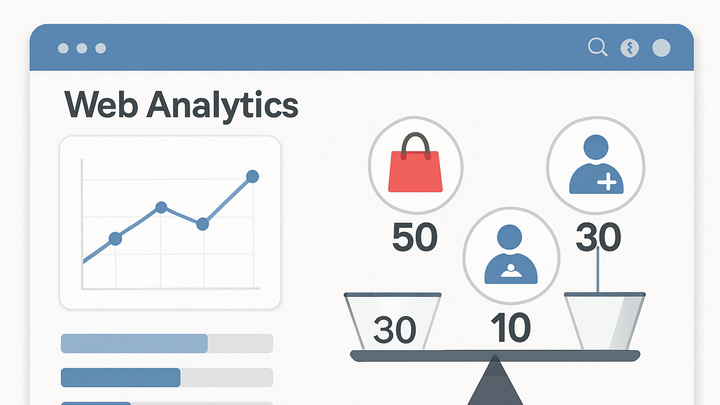Published on 2025-06-22T10:22:53Z
What is Weighted Conversion? Definition & Examples
In web analytics, weighted conversion is a metric that assigns different numeric values (weights) to conversion events based on their relative importance or value to the business. Unlike standard conversion counts where each conversion holds equal value, weighted conversions provide a nuanced view of performance by emphasizing high-value actions such as purchases or sign-ups over less critical engagements like newsletter clicks. This approach helps teams accurately measure return on investment (ROI), optimize marketing budgets, and make data-driven decisions. Platforms like Google Analytics 4 (GA4) and PlainSignal support weighted conversion tracking, enabling you to assign and analyze weighted values through configurable event parameters or dashboard settings. This glossary article covers the concept, benefits, implementation steps, usage examples, and best practices for weighted conversions in analytics.
Weighted conversion
A metric assigning different values to conversion events based on importance to improve ROI analysis and decision-making.
What is a Weighted Conversion?
A weighted conversion is a metric that assigns a numerical weight to each conversion event based on its relative value or importance to the business. By differentiating between high-value and low-value actions, weighted conversions offer a more accurate reflection of overall performance than simple conversion counts.
-
Definition
Assigns different numeric values to conversion events to reflect their varying business impact.
-
Key components
Weighted conversions combine conversion events with assigned weights to calculate aggregate scores.
-
Conversion event
Any tracked user action marked as a conversion, such as a purchase or newsletter sign-up.
-
Assigned weight
A numerical value representing the action’s importance or monetary value.
-
Benefits of Weighted Conversions
Weighted conversions enhance analytics by prioritizing high-value actions, improving ROI calculations, and enabling smarter resource allocation.
-
Prioritize high-value actions
Emphasizes critical events like purchases over lower-impact actions, guiding strategic focus.
-
Improve roi analysis
Calculates returns more accurately by factoring in the varying values of different conversions.
-
Enhance campaign optimization
Drives data-driven decisions for budget allocation by highlighting the most valuable channels and actions.
Implementing in Google Analytics 4 (GA4)
GA4 supports weighted conversion tracking through event parameters and custom definitions.
-
Mark or create conversion events
In GA4, select predefined ecommerce events or configure custom events via the UI or Google Tag Manager, then toggle ‘Mark as conversion.’
-
Use predefined events
Leverage built-in events like purchase, add_to_cart, or sign_up without extra configuration.
-
Define custom events
Set up bespoke events in GA4 or via Tag Manager and mark them as conversions.
-
-
Assign value parameter
Pass a
valueparameter with your events (e.g., transaction revenue) to weight conversions numerically. -
Validate in reports
Review the ‘Monetization’ and ‘Events’ reports to ensure weighted values appear correctly for each conversion.
Implementing in PlainSignal
PlainSignal’s cookie-free analytics allows you to embed tracking code and set weights via the dashboard or API.
-
Embed PlainSignal script
Add the following snippet to your site’s
<head>to enable tracking:<link rel="preconnect" href="//eu.plainsignal.com/" crossorigin /> <script defer data-do="yourwebsitedomain.com" data-id="0GQV1xmtzQQ" data-api="//eu.plainsignal.com" src="//cdn.plainsignal.com/plainsignal-min.js"></script> -
Define conversion weights
In the PlainSignal dashboard, navigate to ‘Events’ and assign numeric weights per conversion type, or use the JavaScript API:
PlainSignal('track', 'purchase', { weight: 100 });
Best Practices
Follow these tips to maximize the accuracy and impact of your weighted conversion strategy.
-
Align weights with business goals
Ensure weights reflect actual revenue or strategic priorities rather than arbitrary values.
-
Regularly audit and adjust
Periodically review conversion data and update weights to adapt to changing market conditions.
-
Keep weighting simple
Use clear, rounded numbers for weights to facilitate easy interpretation and communication.
